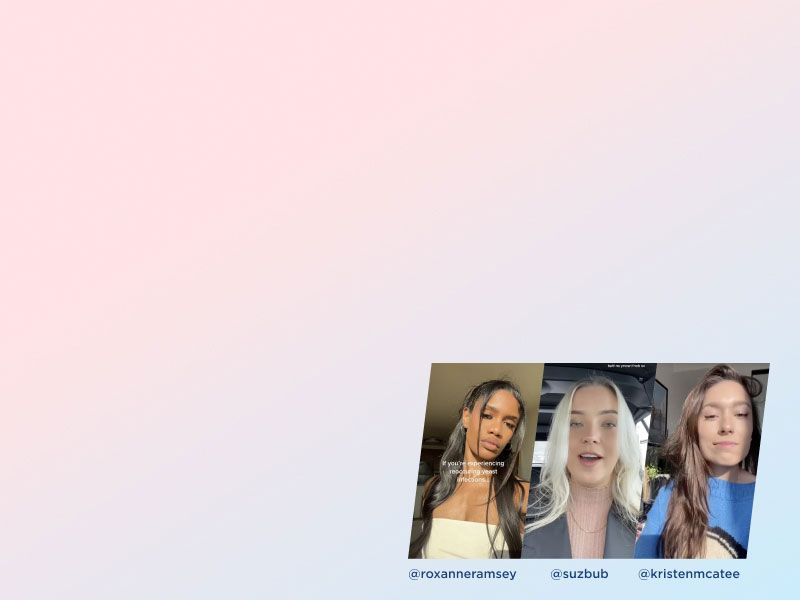
The Women Changing
the Way We Talk About
Women's Health
By Kathleen Morrison
March 14, 2022
March is Women’s History Month, but we aren’t just looking back at the history of women’s health, but also looking at the women who are changing the way we talk about women’s health now! These two amazing ladies are working hard to smash the stigmas around talking about taboo topics: mental health, sexual health, vaginal care, herpes and more!
Kristen McAtee
IG: @kristenmcatee
TikTok: @kristenmcatee
Youtube: Kristen McAtee
Kristen McAtee is a podcast host and content creator who has built an open and safe space to talk about anything across all platforms. She strongly believes vulnerability is key and loves to dive into taboo topics surrounding dating, mental health, childhood trauma, and more! We got the chance to ask her a few questions about her own experiences with vaginal health and the women’s health topics she wants to shine a spotlight on.
You’ve struggled with UTIs before and found Wisp! What inspired you to share your UTI experience online?
I shared my UTI experience online because I was honestly blown away with how easy it was to get what I needed. It was almost like I was waiting for a catch, but before I knew it I had my medicine. I shared my experience for those who don’t or can’t have these open discussions with people in their life. UTIs are normal and shouldn’t be left untreated so I felt everyone should know they have access to this resource too!
After sharing your story, are there any (sensitive) topics people want to hear more about?
My viewers have expressed many times how they want to know more about my journey with endometriosis and my gut health. This year I am making it a priority to heal those 2 things and documenting it along the way!
What do you think we should talk more about when it comes to women's health and rights?
I think each and every aspect is worth talking about when it comes to women’s health. Common things like UTIs and periods are definitely not talked about enough but neither are the less common things like pelvic floor disorders, BV, etc. Bottom line, I think it's about creating a safe space where there are open ears, no judgement, and ANYTHING can be asked and answered.
Roxanne Ramsey
IG: @roxanne_ramsey
TikTok: @roxanneramsey
Roxanne Ramsey is based in Baltimore, MD and she’s been a long-time wisp user and advocate for vaginal health! Her own struggles with BV are well-documented on TikTok and she clearly isn’t alone—her 735k+ followers are all sharing advice and having conversations about how to tackle these extremely common vaginal health challenges. In fact, her own followers helped Roxanne discover Wisp!
You’ve been working with wisp for a while, but how did you first find out about us?
I found out about Wisp from my very first BV video. It went viral and many women tagged Wisp in the comments. I ran to the website and have been obsessed ever since.
What inspired you to share your BV experience online?
I was struggling with BV and felt so much frustration with not being heard by my medical provider. I simply made a video to voice my frustration and defeat. I received comments and messages from thousands of women experiencing the same thing.
What kind of reaction did you get from your audience after sharing about such an intimate and stressful experience?
After sharing my story, I noticed BV was the sensitive topic. I always say, "No one wants to smell like fish." It can be embarrassing and mentally exhausting. I'm so happy I sparked a flame for women to talk openly about it on social media. When I struggled with BV, I wish I could go on social media to see other women talking about it and sharing remedies. The community of women that are openly talking about feminine care are creating a safe space to talk about otherwise sensitive topics.
What else do you think we need to talk more about when it comes to women’s health?
When It comes to women's health, I think we should talk more about women simply being acknowledged. I often make funny videos about 'period days and period pay,' but I truly feel like things like that should exist for women. People actually believe women don't deserve grace when it comes to our bodies. Imagine how amazing it would be to be able to confidently call out of work because of your endometriosis without the fear of being fired or judged. It's such a small thing but would make a huge difference in work-life for women. Not to mention, simply being heard during doctors visits. So many women have no clue how to advocate for themselves and have horror stories of pain during procedures. As well as, WOC being denied treatments and pain medication. I have been there and done that! There's so much to touch on when it comes to women's health but I'm happy more women are talking about it. At least we are one step closer.
Suzanna Elzbieta
Instagram: @suzbubs
TikTok: @suzbub
Youtube: @suzbub
Suzanna is a herpes activist from Toronto, Canada sharing her own journey with her herpes diagnosis and dispelling misinformation about this common STD with her audience online. Herpes is arguably one of the most stigmatized infections out there, but Suzanna has found a supportive community that wants to learn more about this condition!
There’s a lot of stigma attached to a herpes diagnosis—what inspired you to share your journey online?
What inspired me to share my herpes experience online was how devastated I felt upon learning my diagnosis, and how after I was able to learn more about it and unpack the stigma, I realized how culturally charged that diagnosis is by so many factors we can stand up to. Things like conservatism, ignorance, lack of education, insensitivity when it comes to jokes and mentions in popular media — all of these things contribute to a harmful perception of herpes that hurts us way more than the virus does. I wanted to help others in my position avoid feeling the way I did, or come out of it sooner. I wanted people to regain their confidence and sensuality (I was/am a sensual guide first), as those are some of the hardest-hit areas when we experience any STD or herpes diagnosis.
What do you find people are most curious about when it comes to herpes? After sharing my story people typically want to know how I regained that confidence again, how I go about dating and sex, and what led me to get herpes—because there's still a lot of misconceptions around STDs in general and promiscuity, or lack of care and attention to our sexual health and sexual activity. People also often want to know what flare-ups or the physical experience of having herpes is actually like, because there's so much misinformation and stigma around that too.
When it comes to women’s health, what do you think we need to talk more about?
We should talk more about the misogyny and scrutiny leveled against women for getting an STD. I've been called a slt and whre for it, mostly by men, I've been told I was "ran thru" and acquired it by sleeping around, or even that I slept with or picked the wrong men—people think if someone was assaulted, lied to, or given an STD as a result of their partner's lack of care, it's still my/our fault. I think there's a lot of compassion missing for anyone who gets diagnosed with an STD, but women are generally more likely to get screened and tested, and so the onslaught of men telling women they failed in life or are now "used or damaged goods" for getting an STD has to stop. Men need to become more educated about sexual health, get screened more, learn what is and isn't part of their panels, and stand up to examples around them where men are shaming women for something they could easily have and not know.
Feeling inspired yet? Follow us on IG @hellowisp to see more of these ladies along with other beautiful people smashing the stigmas around vaginal health!

